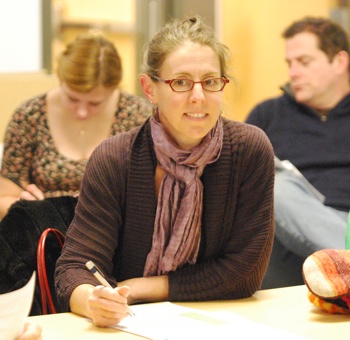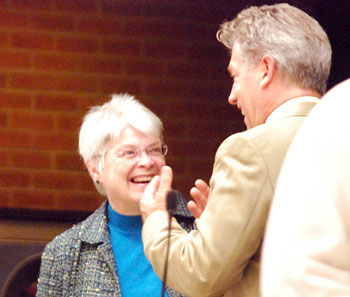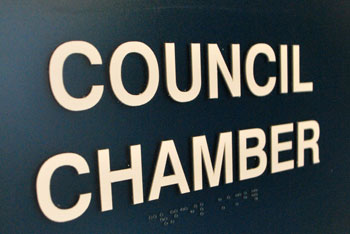Commission Works on Public Art Planning
Ann Arbor public art commission meeting (Jan. 29, 2014): In a three-hour session, the public art commission worked on prioritizing capital improvement projects that might be suitable for public art.

On Jan. 29, Kristin “KT” Tomey attended her first regular meeting of the Ann Arbor public art commission since being appointed by the city council on Jan. 6. (Photos by the writer.)
Some commissioners expressed frustration that they had insufficient information on which to base their evaluation. And after about two hours of discussion – using a scoring rubric with seven criteria – commissioners had evaluated only a few projects: artist-designed street access (manhole) covers, art for the Springwater subdivision, and art for the corridors of Main Street and Plymouth Road. Because there were still several other items on the agenda, they voted to postpone further evaluation of possible capital projects until their next meeting.
In other action, commissioners discussed and approved a draft annual public art plan that’s officially due to the city council on Feb. 1, for projects to be undertaken in the fiscal year that begins July 1. It includes projects that are underway – like artwork for East Stadium bridges and Argo Cascades – as well as a proposal to add some enhanced capital projects, like street access covers on resurfaced roads.
The draft annual plan had been prepared by Aaron Seagraves, the city’s public art administrator. Commissioners asked for some revisions and designated commissioner John Kotarski to work with Seagraves on a final version that will likely be presented to the council on Feb. 18. Kotarski praised the draft, saying “It has as much meat as anyone wants. It shows a lot of work. It shows an art commission that gets the message from an impatient city council.”
Commissioners also discussed a proposal from the Clean Energy Coalition to select and fund an artist who would help incorporate art into a new bike share program. They tabled action on this item, wanting additional information about the CEC’s expectations for funding.
This was AAPAC’s first regular meeting since Oct. 23, 2013, although they held a retreat in December and a planning session earlier in January. Throughout the evening, concerns were raised about the future of the public art program, in light of recent city council discussions. The council had postponed a requested six-month extension of Seagraves’ contract, and will be taking up that item on Feb. 3.
Also on the council’s Feb. 3 agenda is an amendment to the city’s public art ordinance. The amendment would allow the council to return about $800,000 accumulated under the city’s former Percent for Art program to the funds from which that money was drawn, such as the street millage or sanitary sewer fund. It’s the latest in an ongoing transition for the city’s public art program – a transition that’s been unsettling for public art commissioners.
The Jan. 29 meeting marked another transition for AAPAC, which has seen considerable turnover during the past year. It was the first regular monthly meeting for the newest commissioner, Kristin “KT” Tomey, who was appointed by the city council on Jan. 6. And it was the last meeting for Malverne Winborne, whose term ended on Dec. 31. He did not seek reappointment, and was serving until the position was filled. His replacement, Jim Simpson, is expected to be confirmed in a vote at the city council’s Feb. 3 meeting.
Winborne has served as vice chair of AAPAC – but the group held new officer elections on Jan. 29. Bob Miller was re-elected to another one-year term as chair, and John Kotarski was elected vice chair. There were no competing nominations, and both votes were unanimous.
Noting that the Jan. 29 meeting had been especially challenging, Miller thanked commissioners for their work. “This is probably the most belabored meeting I think we’ve ever gone through, aside from maybe one of the retreats,” he said. “I’m tapped out.” He jokingly cajoled commissioners: “Please do come back.”
Miller also encouraged students to return, as about two dozen students from Skyline High School – and some parents – attended the Jan. 29 meeting. “It’s the most amount of people we’ve ever had at any of our meetings,” Miller noted. One student pointed out that they were all from the same government class, facing a Jan. 31 deadline to attend a public meeting. [Full Story]





